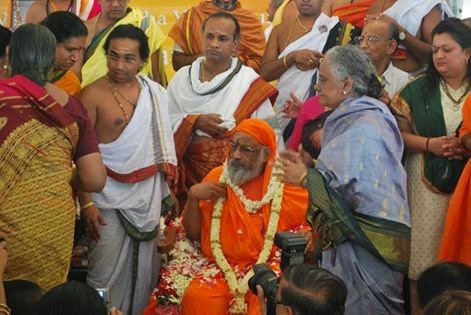Happy Navaratri :
Ratri means "night" and Nava means "nine".
During Navaratri, Ishvara, in the form of Devi is worshiped as Durgā, Lakśmi and Saraswati.
Day 1, 2, 3 - Durga Ma
Day 4, 5, 6- Lakshmi Ma
Day 7, 8, 9 - Saraswati Ma
First we invoke Durga Mata ji to wipe away all our ailments, troubles, inhibitions, and make way for better things to come, by removing all our obstacles that stagnate our emotional, intellectual and physical growth
Next, let Lakśmi Mata ji be invoked, to give us health, and wealth to enrich our minds and lives with all things good, and to make our endeavors successful.
and finally, Saraswati Mata ji, to give us wisdom, and knowledge. These are two of the most precious possessions.
Wisdom is that discriminative tool which which allows us to differentiate between right and wrong, eternal and non eternal, and exercise perfect control over the mind and bodily actions, thus protecting us from inner and outer elements.
The tenth day is called Vijayadasami, which marks the return of Rama bhagavan from Lanka to Ayodhya, after defeating the rakshasa Ravana and rescuing Sita ji. Vijaya means "victory", also symbolic of the victory over our own minds. It is typical in many traditional households to chant the Ramayana on the first day, and complete it on the tenth day, coinciding with Rama's return.
Some other things one can do during Navratri include
1) Mataji's Aarati
2) Fasting: A few fasts that you may choose to do:
a) Eat just fruits and liquid for 9 days,
b) Eat just grains and liquids for 9 days (no spices, salt, sugar, oil)
c) Eat one meal each day, and liquids
d) Fast completely on the 9th day
- All fasts are broken on Dasami (the 10th day)
3) Prayers such as Durga Sukta, Sri Suktam, Medha Suktam, Durga Saptashti, Durga Kavachh, Lalita Sahasranama, Lalita Trishati- which you may read Durga Suktam, (Laxmi) Sri Suktam, (Saraswati) Medha Suktam , Lalita Sahasranama.
4) Reading On the evening of the 8th day. we keep our important books and tools related to study and work for pooja, and perform pooja on the 9th day. On the day of daśami (10th day), we take it back...this is called Ayudha puja. Ayudham means tool.
5) Learning something new - On the day of daśami we do the vidyārambam. Which literally means "the beginning of the learning". In kerala, they even have public holidays in order to facilitate this. Learning something (old and new) on daśami is considered to be very auspicious, and also it is a great time to start afresh.
You may also choose to learn new prayers, maybe a musical instrument, a new language like sanskrit, etc.
Personally, I'm planning on resuming the studies of a few śāstras that I have been putting off
Navarātri is marked with a basket-full of auspicious events for your spiritual growth, let us make the best of it.
Wishing you a very happy festive season.
Swami Dayananda Saraswati




Comments